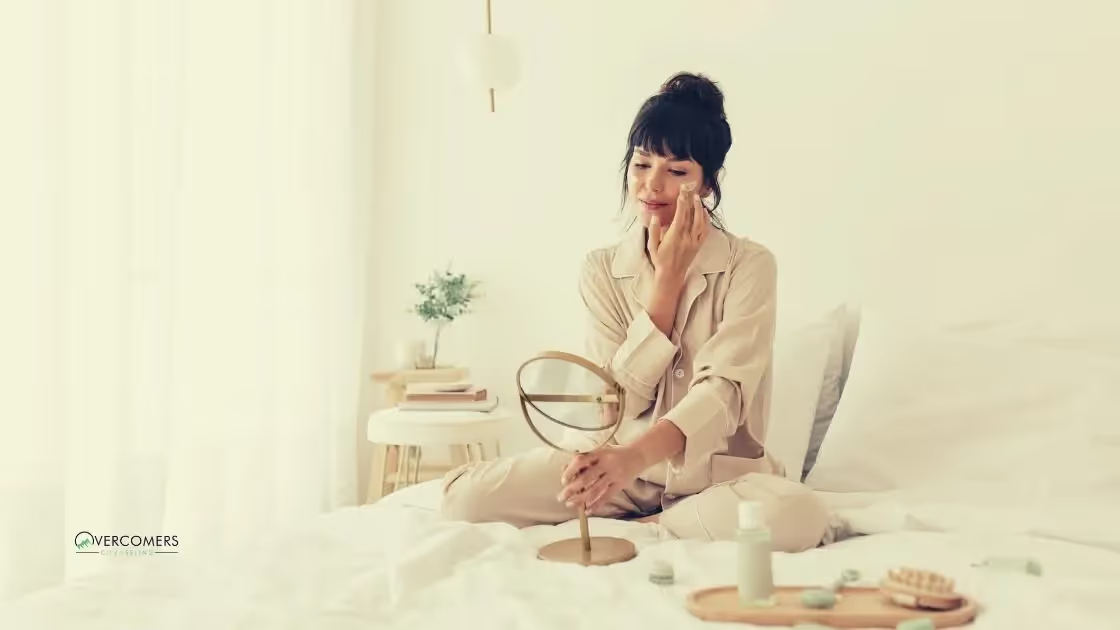Self-care for mental health is more beneficial than people tend to realize. In fact, it has been clinically proven to reduce or eliminate stress, anxiety,...

Self-care for mental health is more beneficial than people tend to realize.
In fact, it has been clinically proven to reduce or eliminate stress, anxiety, and depression.
If you're someone who can relate, read on, your coping remedy may be just as simple as a relaxing self-care Sunday.
Anxiety and depression often go hand in hand.
When a frustrating thought or gloomy mood lingers for too long, it interferes with normal daily activities and self-care tends to be put on the back burner.
The negative symptoms that arise can be overwhelming and sometimes unpredictable.
Without healthy coping mechanisms, it can worsen over time.
The awesome part about self-care is that it can be used alongside sessions with your therapist since it is one of the most effective and intentional practices of directing the focus back onto self. It's another great way to boost your mood, especially in times of stress, anxiousness, or experiencing the dark cloud of depression.
Furthermore, studies have shown the more we practice self-care activities, the more confident we are since our personal morale increases and we tend to make better decisions, build stronger connections, and communicate more effectively.
It can also be a great way to calm the irrational thoughts and overthinking that come with anxiety and depression.
Self-care is also not one size fits all, what works for one person may not work for the other.
Some people may find a massage from a local spa more relaxing than yoga.
Your self-care style depends on what works best for you, what you enjoy, your personality, and other factors such as gender.
Regardless of the self-care style, practicing self-care for mental health can be highly beneficial. It can consist of a variety of techniques and lifestyle changes that can help significantly alleviate the symptoms and prevent them from getting worse.
In addition, self-care can be broken into three different categories: Physical, Mental, and Emotional.
Physical self-care can consist of switching up your diet and exercising. Physical activity such as exercise has proven to be excellent for mood enhancement.
Mental and Emotional self-care can range from breathing techniques to soothing mindfulness meditation.
Simply giving yourself some alone time is important to function properly in our daily activities.
It is also much easier to slip into a calm state for meditation and tap into some self-reflection.
Self-care not only soothes your mental state, but it encourages self-awareness.
Self-awareness is the catalyst to recognizing patterns in your emotions and other symptoms that are Anxiety/Depression related.
It can also help identify what activities are the most effective when negative symptoms arise.
This is why taking time to take a step back to practice self-care for mental health can help tremendously.
Here are a few self-care ideas and tips you can practice at home that can help ease anxiety and depression:

Go out for a walk or jog: One of the most effective ways to lower anxiety and depression levels is through exercise.
Walk to your mailbox or the store instead of driving if you can, while you get some vitamin D from the sun's rays.
It has also been said that sun exposure can help fight depression.
Pamper Yourself at Home!: Pampering yourself can leave you feeling rejuvenated.
It can consist of classic foamy bubbles, scented soaps, clay or sheet masks, etc.
Getting a pedicure is another way no matter what gender you are, getting pedicures can be a nice therapeutic break from your busy life.
Foot soaks and massages are believed to reduce symptoms of anxiety and depression since they can significantly eliminate tension.
Aromatherapy: Another great and effective way to find a sense of inner peace is to engage your senses.
Let yourself unwind and light scented candles, incense, or oils while doing your evening breathwork.
Lavender and Frankincense are one of the most popular for calming anxiety.
Get a massage: Treat yourself at least once a month to a relaxing massage at your local spa!
Massage Therapy increases dopamine, norepinephrine, and serotonin levels in your body which can help alleviate anxiety and depression.
The thing about Depression is that it can cause a person to feel stuck with nothing to look forward to.
The psychology of having something to look forward to can have positive effects on our mood.
It can also help someone to remain living in the present which can benefit Anxiety in so many ways.
It's the little things we tend to look forward to that puts a smile on our face. These types of methods can go a long way and can be implemented into almost any basic self-care routine.

Although those mentioned above are great alternatives to soothing anxiety and depression symptoms, there are basic self-care essentials that must be done by every human on this planet in order for the body to properly function.
Without it, it can lead down a path to burnout, multiple meltdowns, and health complications.
It's important to understand that basic self-care is mandatory self-care. Here are a few friendly reminders:
Self-care for mental health as a whole can be just as good for your mind as it is for your body.
Anxiety and depression can be an emotionally-exhausting rollercoaster but practicing self-care for mental health may be just what you need.
Mark your calendars or whatever you need to do to ensure you are not only putting yourself first but taking the time out to take great care of yourself.
Other activities which have been found helpful in reducing both immediate feelings of anxiousness and long-term anxieties associated with chronic disorders include yoga, journaling, nature walks, art therapy, volunteering, and other low-stress activities. Additionally, developing a healthy lifestyle incorporating adequate sleep, physical activity, and nutritious meals can help reduce overall stress levels.
To reduce your anxiety, you can practice relaxation techniques such as deep breathing, progressive muscle relaxation, guided imagery, and mindfulness practices. Additionally, regular exercise has been found to be beneficial in managing stress and improving mental health.
Ignoring anxiety can exacerbate symptoms and make it more challenging to manage over time. This can result in a negative impact on your personal, professional, and social life, leading to feelings of isolation and even depression.
It's important that you feel comfortable discussing personal matters with your therapist in order to open up and get more out of therapy sessions; therefore finding someone who meets certain criteria like experience level, expertise areas, and personality is key when selecting a therapist who can give meaningful feedback about how best handle issues related to anxiety or other mental health concerns.
Addressing anxiety is crucial because it can significantly impact your quality of life and overall well-being. Left untreated, anxiety can lead to more severe mental health issues, relationship problems, and difficulty functioning in daily life.
Yes, Medicaid provides insurance coverage for therapy services specifically designed to help individuals struggling with anxiety, depression, and other mental health conditions.